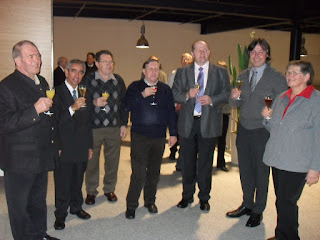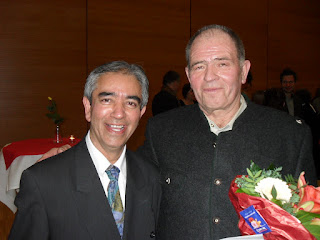Satis Shroff and a social worker from Freiburg
Mr. Hermann Dittmers (CDU) & Richard Linder (MGV)
A toast to Satis Shroff by VIPs from Kappel & MGV
Satis Shroff with the singers from Betzenhausen
Green City Freiburg Honours Satis Shroff, Kappel
At an official ceremony in Freiburg’s Exhibition Hall Ulrich von Kirchbach, the mayor in charge of Culture and Integration honoured the life work of Satis Shroff. In his laudatio, von Kirchbach presented an Urkunde from the City of Freiburg as a special acknowledgement for Satis Shroff’s commitment and prolonged support and assistance to refugees and foreign students, and as a member of the managing committee of the Männergesangverein (men’s choir) ‘Liederkranz’ Freiburg-Kappel.
Satis Shroff was awarded the DAAD Prize in 1998.
Culture can give you insight into the living world of refugees, it can help remove boundaries and open new horizons, thereby enhancing the development of creativity in humans. Accordingly, Satis Shroff said in his thank-you-message: “I’d advise migrants to join a German association (verein), for that’s the place to meet the Germans and interact positively with them. I’m a member of the MGV Kappel, where we sing old and new German and English songs. After the singing we invariably go to one of the two taverns in Kappel to joke, laugh and talk about what moves us. There’s respect, tolerance, compassion among the singers and a good feeling of togetherness within the community. Whether it’s religious or seasonal events, funerals or initiation-rites, the men’s choir is always there, taking part in all walks of life. In this way, we get to know our strengths and weaknesses and help each other with sound advice and action. As we say in Germany: I really feel ‘Sauwohl in Kappel,’ which means I feel great. I can’t imagine a better integration in the German mainstream.”
In the past, and even now and then, Satis Shroff has cared for refugee children from Bosnia, Madedonia and Kosovo-Albania and did pedagogic work with them. Many children were able to make the necessary grades and others were sent to their home-countries as soon as the krieg ceased in their country of origin. He remembers cases of refugee-families who were woken up from their sleep in the wee hours of the morning by the police and whisked away to Frankfurt, put in a plane and escorted to their countries. This is the other side of the world-wide refugee problem.
“One day, a tall and burly, unshaven Albanian man came to the social office and took us as prisoners. He hand a big plastic bag with a canister of petrol and a gun in his hand and said, “If you don’t do what I say I’ll blow you all up.” We were terrified. He was a father who’s daughter had been taken away by the social department because he’d been maltreating her. Whew! That was a traumatic experience. I thought my life was going to end there,” said Satis Shroff.
As a contact person and counsellor for the DAAD and the Alexander von Humboldt Stipendium he worked in cooperation with the Academic Foreign Office in Freiburg and cared for students and scientists from Nepal, India and the United Kingdom and he still maintains good contacts with these academicians.
Satis Shroff speaks English, German, Nepali, Hindi and Urdu and has also worked as a translator with the Amtsgericht on a honorary basis. He has assisted the migrants where he could and he says: “Migrants are helpless in a foreign country and there are cultural, social and language barriers. They a confronted with a strange administrative system and unusual laws and jurisprudence. All this makes the migrant raise his or her hands in despair.”
He was officially requested by the town of Ilmenau to translate Goethe’s famous poem: ‘Wandrers Nachtlied. He has also translated Nepali literature into Nepali. His German book of poems ‘Im Schatten des Himalaya’ has been printed by www.lulu.com/satisle. He has also written two Nepali language books for German development workers of GTZ, Goethe Institute, DAAD and the members of the Carl Duisberg Society.
Before he came to Germany for further studies, he worked as a Features Editor with the Rising Nepal, where he wrote editorials and a science column, and commentaries for Radio Nepal on themes pertaining to the country’s development, wildlife and culture.
Satis Shroff is a lecturer, poet, journalist and a passionate singer. ‘I simply love singing Nepali, Hindi, English and German songs,’ he says. He’s a prolific writer and a contributing writer on www.americanchronicle.com/authors/view/1207
and on www.blogs.boloji.com/satisshroff and satisshroff.tigblogs.org to name a few.
He likes to describe himself a mediator between western and eastern cultures and sees his future in social engagements in the French sense of the word, and in writing and teaching medical subjects and English and German literature.










